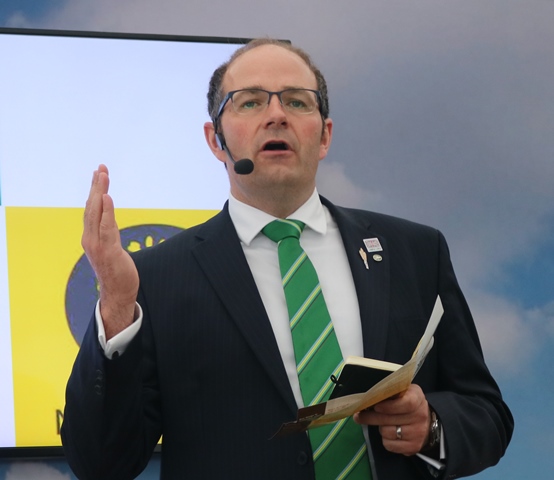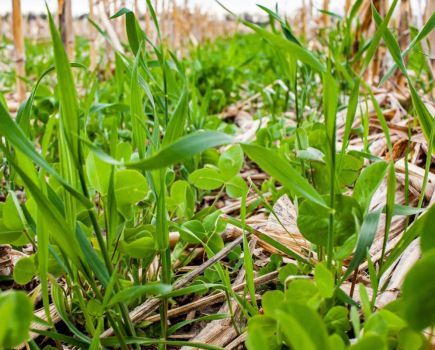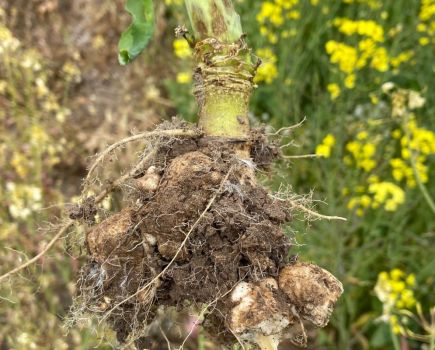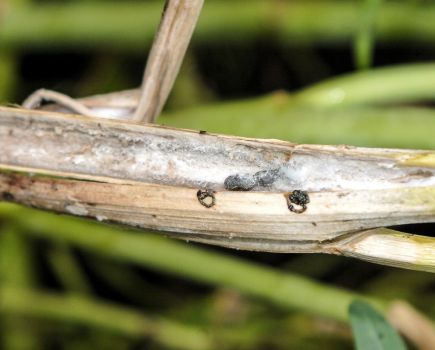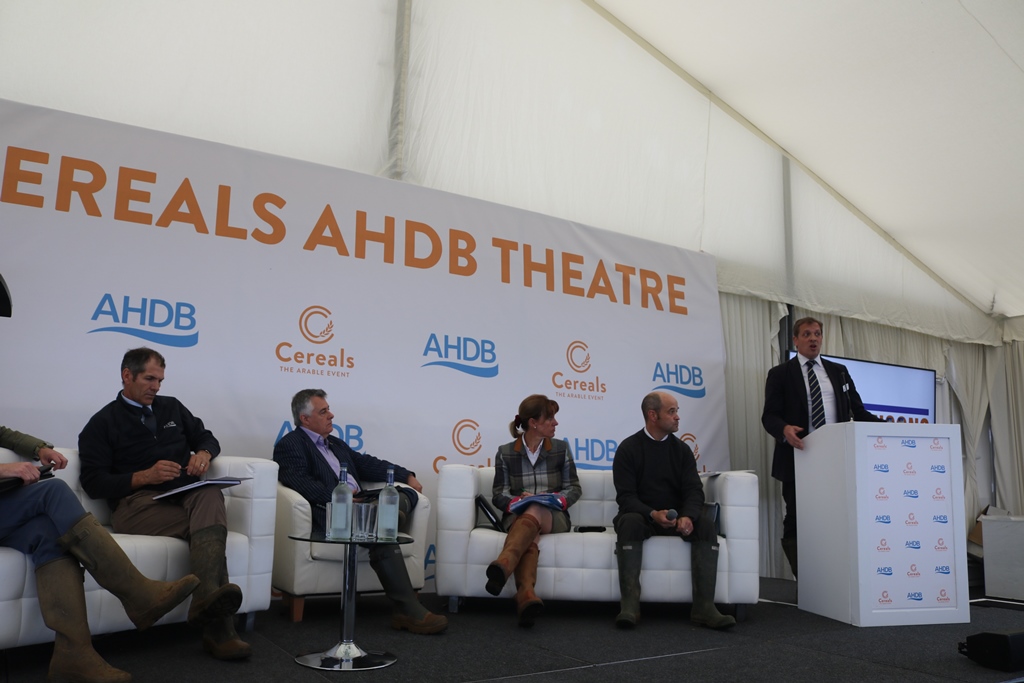
By Tom Allen-Stevens
Farming minister Robert Goodwill has been roundly criticised for failing to turn up to Cereals to show support for arable farmers. Amid fears from farming leaders that the Agriculture Bill has stalled, leaving the sector in limbo, there are now calls for Defra to “push the pause button” on the transition to a new support system until it can provide some clarity and direction.
The first day of Cereals coincided with a move by opposition parties in Parliament to take a no-deal Brexit off the negotiating table. This caused the minister to abandon plans to visit the Lincs-based event to get to Westminster to vote against the motion. But with the prospect of a no deal seen as “catastrophic” by many in the farming industry, this in itself was viewed as another snub to the arable sector.
“It’s totally disappointing that Robert Goodwill hasn’t appeared,” said NFU president Minette Batters. “And it’s outrageous that he hasn’t even sent a Defra official, just at a time when farmers desperately need certainty and clarity of thinking.”
The most immediate concern is over what tariffs arable commodities will face as a consequence of Brexit. “For us, trade policy is every bit as important as agricultural policy. The arable voice is one that hasn’t been heard nearly loud enough, and yet it underpins every sector in food and farming,” she continued.
“The most important aspect to get right is the level playing field, and it’s shameful we haven’t seen that approach [from Government].”
But Minette was clear about the leading role she sees UK arable farmers playing. “Climate change is the challenge of our time – I want to pitch farming as part of the solution.”
The NFU made the proactive step, announced at Oxford Farming Conference, of a target for UK Farming to reach net zero by 2040. That had “opened every door” to a whole range of influential organisations and government bodies who now want to work with farmers towards delivering this, said Minette.
“We have the opportunity to shape that change, and we need to grasp it with both hands. The real risk is that we export our standards and our production abroad. We can lead net zero if there is a willing government to work with the industry.”
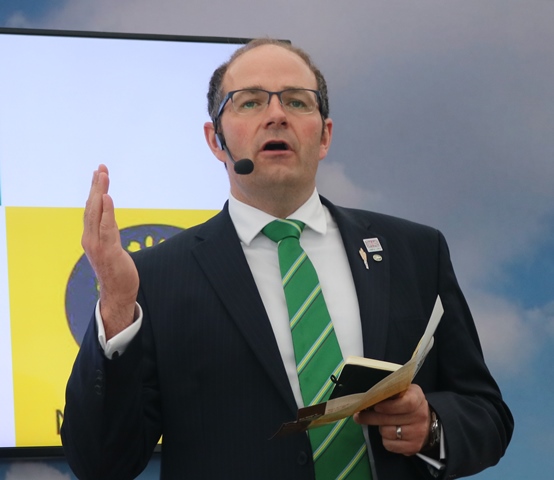
NFU combinable crops board chairman Tom Bradshaw
But this is just where the NFU has “grave concerns”, combinable crops board chairman Tom Bradshaw told CPM. “The timeline of delivery of the Agriculture Bill and Environmental Land Management (ELM) contracts seems to be way behind. It’s questionable whether it’s possible for Defra to deliver the transition under the current timeline.”
The first round of Test and Trials for the new ELMs was supposed to start in April, but there are fears the correct framework hasn’t yet been put in place to manage them, and there’s a question mark over funding. Meanwhile applicants for the second round of proposals, lodged before April, have not yet heard if these have been successful.
Adding to the uncertainty, Tom said the ministerial no-show at Cereals undermined the status the government holds for UK arable farmers. “Having a minister who’s unable to represent pressing issues for the sector at a major agricultural event because he feels he has to vote for his own political party doesn’t give grounds for confidence in how he’ll direct agricultural policy.”
The NFU’s Your Harvest campaign is urging farmers to encourage their MPs to come onto farms as the harvest comes in and show them the true value of combinable crops to society. “We are the backbone of the agricultural industry providing the raw ingredients for our livestock and also the UK’s largest manufacturing industry – Food and Drink. We currently face huge uncertainty from many areas including Brexit but also pesticide regulation. There has never been a more important time to get your MP on farm and sell the positives,” said Tom.
AHDB chairman Peter Kendall also spoke of the “madness” that’s gripped Westminster, and the “craziness of the Conservative leadership campaign in which farming is being totally ignored in the political debate”.
“Climate change is massively impacting on agricultural systems around the world. The detachment of politics from how we feed a UK population of 65 million is important for us to address. But among this madness and uncertainty, the biggest risk is to put on hold the decision making. The industry and individual businesses should focus on how to prepare for what’s coming,” he said.
Soil health ‘not a public good’, says minister
Farmers who deliver improvements to their soils are unlikely to receive support under the new Environmental Land Management (ELM) contracts. Farming minister Robert Goodwill, speaking at the Groundswell event in Herts last month, said good soil health is not viewed by Government as one of the “outcomes” it’s looking to support.
“At this stage I wouldn’t envisage that paying for soil health was necessarily a public good,” he said in an interview at the event with journalist Baroness Rosie Boycott. “But the things that flow from that are just the sorts of things I think people would want to pay for.”
The minister didn’t specify exactly what sort of outcomes the Government would reward through ELMs, although he did indicate improvements in organic matter may improve a soil’s capacity as a carbon sink and improvements in soil structure could help drainage problems, for example.
He said he was hoping to transition to a system of paying public money for public goods that organisations such as Greenpeace and Friends of the Earth would support. “I’m optimistic that as we move through the transition from 2021 to 2027, people will see the results and they will be on the side of the farmers and want to help them deliver that through their taxes.”
Exactly what schemes will be supported will come from the ELM Tests and Trials – the minister indicated that 48 of these from the first round of applications are “ready to sign off” but hadn’t started, while another 200 applicants are waiting to hear if their suggestions will also be included in the programme.
“I’m optimistic they will make financial sense for the farmer – the money should not just be compensation for income forgone and investment made, but also give them a profit margin on doing that.”
But he indicated the Agriculture Bill was making slow progress through Parliament, and Brexit remains the priority. “Before we can deliver our policy, we need to leave the EU,” he said.

